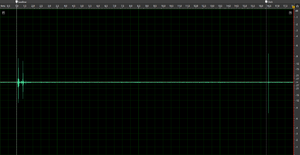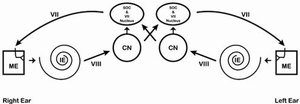I have this problem myself. I have been reading about this again lately and going over the reported symptoms by other people. Seeing that this thread got no replies I would like to offer my explanation of what I think is going on.
First things first, I am not a medical doctor or a trained researcher. What I will write here is my own understanding of the problem, which I have gathered by observing my own symptoms, reading about other people's symptoms, and reading a lot of texts about the ear anatomy and physiology.
Before we begin, we have to understand that many people report about symptoms of clicking ears. More often than not, the Eustachian tube is blamed for this. It's called Eustachian tube dysfunction, or ETD for short. Another often cited cause is TMD, that is Temporomandibular joint dysfunction, sometimes wrongfully abbreviated as TMJ which refers to the join itself. These may be valid causes in some people. But certainly not in as many as accounted for when people present symptoms of hearing loss and tinnitus. Yes, I am implying that people are being misdiagnosed or mislead. Being mislead by reading patient reports on the web is understandable, but being misdiagnosed by a medical doctor is unacceptable.
You can read all about ETD and TMD on other forum threads and on external websites. I will be focusing on the type of clicks that I myself have, and that a number of you on this forum appear to have.
So what is it then that you have? These are the symptoms that seem to be most common among all of those that have this.
1. Click sounds.
2. Triggered when swallowing.
3. Happens mostly during the evening and night.
4. Sometimes triggered at random without swallowing.
If you don't have ETD and you don't have TMD, then what you have here is MEMM. That is, middle ear muscle myoclonus. More precisely, it is Stapedial myoclonus. Spasms of the muscle in the middle ear in layman's terms. Not just any muscle but the smallest muscle in the human body.
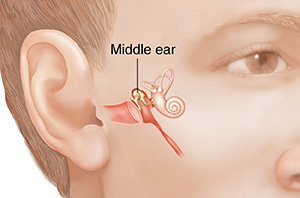
What happens is that the Stapedius muscle contraction causes displacement of the Stapes head, perpendicular to the normal motion of the Stapes in response to sound. This contraction causes the head to move out of the Incudostapedial joint where the head of Stapes meets the Lenticular process of the Incus. As the muscle relaxes, the head snaps back into its original position and a click sound is generated as bone meets bone. So the click sound I believe is generated at the Incudostapedial joint.
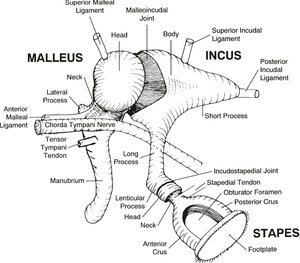
The sound could also be generated by the Malleoincudal joint. But according to the texts I have read, the Incus and the Malleus are not displaced as a result of Stapedius muscle contraction. It's hard to imagine how it could if you look at the anatomical illustration above. The Stapes is pulled in dorsally when the muscle contracts.
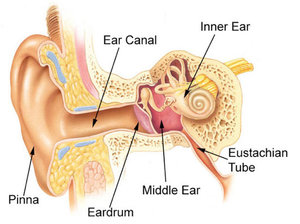

 Member
Member Manager
Manager


